如何应对专四听力
- 格式:docx
- 大小:47.40 KB
- 文档页数:17
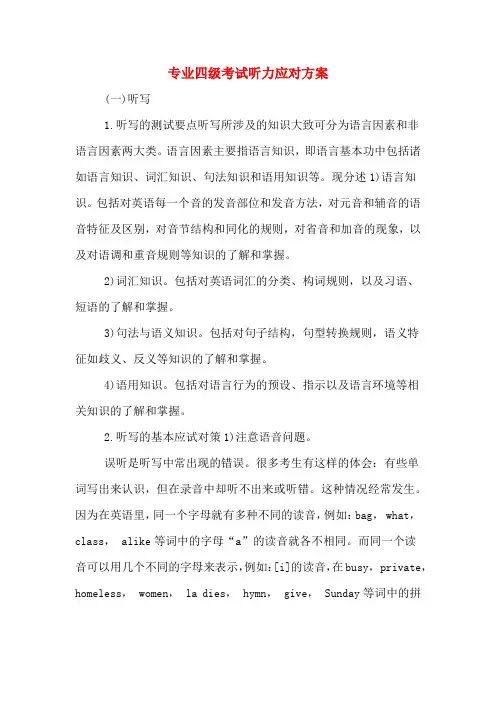
专业四级考试听力应对方案(一)听写1.听写的测试要点听写所涉及的知识大致可分为语言因素和非语言因素两大类。
语言因素主要指语言知识,即语言基本功中包括诸如语言知识、词汇知识、句法知识和语用知识等。
现分述1)语言知识。
包括对英语每一个音的发音部位和发音方法,对元音和辅音的语音特征及区别,对音节结构和同化的规则,对省音和加音的现象,以及对语调和重音规则等知识的了解和掌握。
2)词汇知识。
包括对英语词汇的分类、构词规则,以及习语、短语的了解和掌握。
3)句法与语义知识。
包括对句子结构,句型转换规则,语义特征如歧义、反义等知识的了解和掌握。
4)语用知识。
包括对语言行为的预设、指示以及语言环境等相关知识的了解和掌握。
2.听写的基本应试对策1)注意语音问题。
误听是听写中常出现的错误。
很多考生有这样的体会:有些单词写出来认识,但在录音中却听不出来或听错。
这种情况经常发生。
因为在英语里,同一个字母就有多种不同的读音,例如:bag, what,class, alike等词中的字母“a”的读音就各不相同。
而同一个读音可以用几个不同的字母来表示,例如:[i]的读音,在busy, private,homeless, women, la dies, hymn, give, Sunday等词中的拼写形式又不相同。
所以考生一定要弄懂某一字母在具体单词中的正确发音,以及某一单词中每个字母的正确发音,以免在听力上产生错觉。
2)处理好听与写的关系。
听与写是一对矛盾。
由于时间限制,有些考生可能出现顾了听而来不及写或顾了写而影响听的现象。
因此,在听写中必须正确处理好两者的关系。
在听写中,写应依据以下三个步骤:①听;②边听边写;③边听边检查。
有的考生在听第一遍录音时就动笔写,这是不正确的。
这样做看起来好像抓住了一些内容,但容易分散精力,影响对全文内容的理解,造成因小失大的结果。
因此,在听第一遍录音时应着重了解全文大意,必要时可记下几个关键词语。
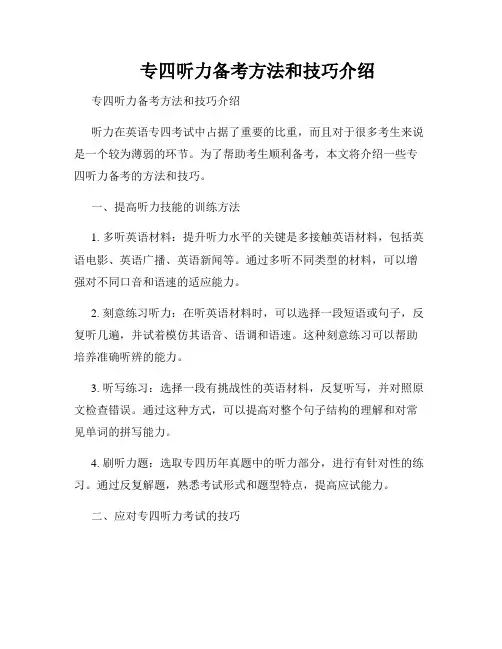
专四听力备考方法和技巧介绍专四听力备考方法和技巧介绍听力在英语专四考试中占据了重要的比重,而且对于很多考生来说是一个较为薄弱的环节。
为了帮助考生顺利备考,本文将介绍一些专四听力备考的方法和技巧。
一、提高听力技能的训练方法1. 多听英语材料:提升听力水平的关键是多接触英语材料,包括英语电影、英语广播、英语新闻等。
通过多听不同类型的材料,可以增强对不同口音和语速的适应能力。
2. 刻意练习听力:在听英语材料时,可以选择一段短语或句子,反复听几遍,并试着模仿其语音、语调和语速。
这种刻意练习可以帮助培养准确听辨的能力。
3. 听写练习:选择一段有挑战性的英语材料,反复听写,并对照原文检查错误。
通过这种方式,可以提高对整个句子结构的理解和对常见单词的拼写能力。
4. 刷听力题:选取专四历年真题中的听力部分,进行有针对性的练习。
通过反复解题,熟悉考试形式和题型特点,提高应试能力。
二、应对专四听力考试的技巧1. 提前预习:在考试前的准备阶段,可以提前阅读听力材料的相关内容,了解主题、背景和相关词汇。
这样可以增加对材料内容的理解难度,提前准备的知识可以帮助更好地理解听力材料。
2. 抓住关键词:在听力过程中,要注意抓住关键词,以快速理解和记忆信息。
关键词可以是数字、时间、地点、人名等。
通过识别关键词,可以更好地组织整个听力信息,准确抓住听力要点。
3. 注意听力前后的提示:听力材料通常会在开始和结束时给出提示和指导,例如“现在你将听到一段对话/独白”,以及“听力结束,请作答”。
这些提示和指导可以帮助考生更好地理解听力材料和掌握答题时间。
4. 结合听力材料的语境:在听力过程中,要尽量将听到的信息与语境相结合,理解细节的同时也要注意整体的逻辑关系。
通过把握整个语境,可以更好地推断出答案。
5. 练习做笔记:在听力过程中,可以用英文简化的方式做一些关键信息的笔记,如日期、时间、关键词等。
这样可以帮助记忆和整理听到的信息,以便在回答问题时可以更有根据。
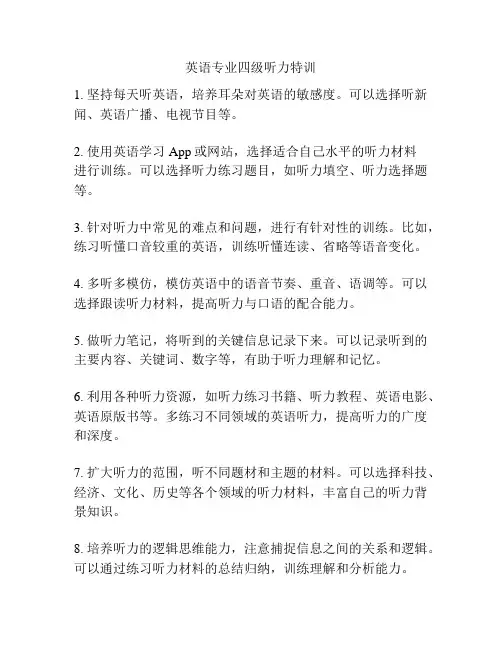
英语专业四级听力特训
1. 坚持每天听英语,培养耳朵对英语的敏感度。
可以选择听新闻、英语广播、电视节目等。
2. 使用英语学习App或网站,选择适合自己水平的听力材料
进行训练。
可以选择听力练习题目,如听力填空、听力选择题等。
3. 针对听力中常见的难点和问题,进行有针对性的训练。
比如,练习听懂口音较重的英语,训练听懂连读、省略等语音变化。
4. 多听多模仿,模仿英语中的语音节奏、重音、语调等。
可以选择跟读听力材料,提高听力与口语的配合能力。
5. 做听力笔记,将听到的关键信息记录下来。
可以记录听到的主要内容、关键词、数字等,有助于听力理解和记忆。
6. 利用各种听力资源,如听力练习书籍、听力教程、英语电影、英语原版书等。
多练习不同领域的英语听力,提高听力的广度和深度。
7. 扩大听力的范围,听不同题材和主题的材料。
可以选择科技、经济、文化、历史等各个领域的听力材料,丰富自己的听力背景知识。
8. 培养听力的逻辑思维能力,注意捕捉信息之间的关系和逻辑。
可以通过练习听力材料的总结归纳,训练理解和分析能力。
9. 多和母语为英语的人交流,提高听懂不同口音和语速的能力。
可以参加英语角、找外教进行交流,增加与母语为英语的人的互动机会。
10. 坚持不懈,耐心训练自己的听力。
听力是一个长期积累和
提高的过程,需要持之以恒地进行训练和反复练习。
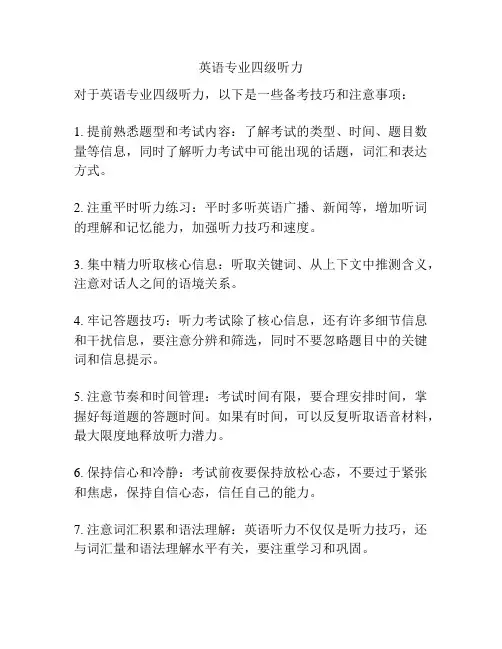
英语专业四级听力
对于英语专业四级听力,以下是一些备考技巧和注意事项:
1. 提前熟悉题型和考试内容:了解考试的类型、时间、题目数量等信息,同时了解听力考试中可能出现的话题,词汇和表达方式。
2. 注重平时听力练习:平时多听英语广播、新闻等,增加听词的理解和记忆能力,加强听力技巧和速度。
3. 集中精力听取核心信息:听取关键词、从上下文中推测含义,注意对话人之间的语境关系。
4. 牢记答题技巧:听力考试除了核心信息,还有许多细节信息和干扰信息,要注意分辨和筛选,同时不要忽略题目中的关键词和信息提示。
5. 注意节奏和时间管理:考试时间有限,要合理安排时间,掌握好每道题的答题时间。
如果有时间,可以反复听取语音材料,最大限度地释放听力潜力。
6. 保持信心和冷静:考试前夜要保持放松心态,不要过于紧张和焦虑,保持自信心态,信任自己的能力。
7. 注意词汇积累和语法理解:英语听力不仅仅是听力技巧,还与词汇量和语法理解水平有关,要注重学习和巩固。
8. 考前预备心理调整和休息:在考前做好心理调整和场馆布置等准备工作,休息好身体,保持精神状态的最佳状态。
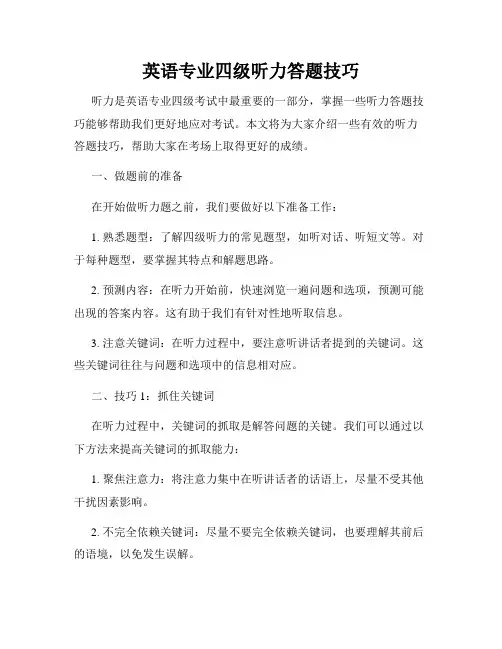
英语专业四级听力答题技巧听力是英语专业四级考试中最重要的一部分,掌握一些听力答题技巧能够帮助我们更好地应对考试。
本文将为大家介绍一些有效的听力答题技巧,帮助大家在考场上取得更好的成绩。
一、做题前的准备在开始做听力题之前,我们要做好以下准备工作:1. 熟悉题型:了解四级听力的常见题型,如听对话、听短文等。
对于每种题型,要掌握其特点和解题思路。
2. 预测内容:在听力开始前,快速浏览一遍问题和选项,预测可能出现的答案内容。
这有助于我们有针对性地听取信息。
3. 注意关键词:在听力过程中,要注意听讲话者提到的关键词。
这些关键词往往与问题和选项中的信息相对应。
二、技巧1:抓住关键词在听力过程中,关键词的抓取是解答问题的关键。
我们可以通过以下方法来提高关键词的抓取能力:1. 聚焦注意力:将注意力集中在听讲话者的话语上,尽量不受其他干扰因素影响。
2. 不完全依赖关键词:尽量不要完全依赖关键词,也要理解其前后的语境,以免发生误解。
3. 注意词义变化:有时,听讲话者可能会用同义词或近义词来表达同一个意思,我们要学会捕捉这种变化。
三、技巧2:精确把握信息在做听力题时,我们需要准确地把握信息,以便选出正确答案。
以下是一些建议:1. 注意细节:注意听力材料中的细节信息,如时间、地点、人物等。
这些细节通常与问题和选项中的内容有关。
2. 善于判断听力文本的宏观框架:通常,听力文本会按照时间顺序或空间顺序展开,我们要善于把握听力文本的整体结构。
3. 同时笔记:如果考试允许,我们可以在听力过程中同时做笔记,将重要信息记录下来,以便后续查找。
四、技巧3:多练习模拟试题只有通过大量的练习,我们才能真正掌握听力答题技巧。
我们可以利用模拟试题来进行练习。
1. 分类练习:将听力题按题型分类,分别进行练习,以熟悉每种题型的解题思路。
2. 模拟考试:模拟真实考试环境,完成一套完整的听力试卷,评估自己的答题能力。
3. 复习错题:复习并总结做错的听力题,找出出错的原因,避免相同错误的再次发生。
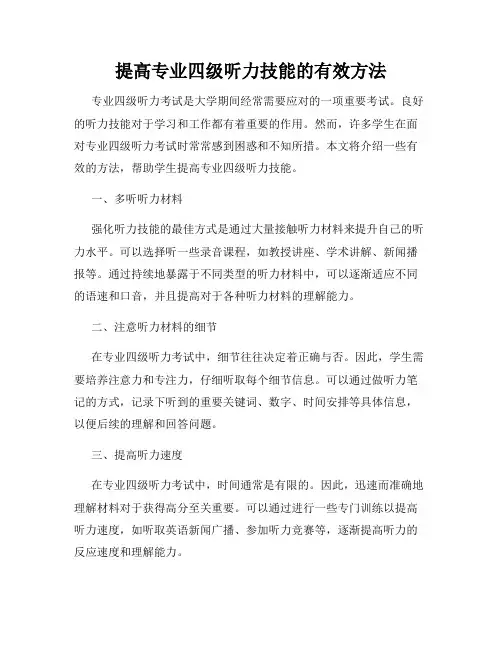
提高专业四级听力技能的有效方法专业四级听力考试是大学期间经常需要应对的一项重要考试。
良好的听力技能对于学习和工作都有着重要的作用。
然而,许多学生在面对专业四级听力考试时常常感到困惑和不知所措。
本文将介绍一些有效的方法,帮助学生提高专业四级听力技能。
一、多听听力材料强化听力技能的最佳方式是通过大量接触听力材料来提升自己的听力水平。
可以选择听一些录音课程,如教授讲座、学术讲解、新闻播报等。
通过持续地暴露于不同类型的听力材料中,可以逐渐适应不同的语速和口音,并且提高对于各种听力材料的理解能力。
二、注意听力材料的细节在专业四级听力考试中,细节往往决定着正确与否。
因此,学生需要培养注意力和专注力,仔细听取每个细节信息。
可以通过做听力笔记的方式,记录下听到的重要关键词、数字、时间安排等具体信息,以便后续的理解和回答问题。
三、提高听力速度在专业四级听力考试中,时间通常是有限的。
因此,迅速而准确地理解材料对于获得高分至关重要。
可以通过进行一些专门训练以提高听力速度,如听取英语新闻广播、参加听力竞赛等,逐渐提高听力的反应速度和理解能力。
四、利用各种听力资源为了寻找适合自己的听力资源,学生可以利用互联网上众多的听力学习网站和应用程序。
这些资源包括专业四级听力材料、模拟考试、听力课程等。
通过使用这些资源,学生可以获得更多的练习机会和反馈,有针对性地提升自己的听力水平。
五、参加听力讨论小组与其他学生一起学习和讨论听力材料是提高听力技能的另一种有效方法。
通过参加听力讨论小组,学生可以与他人分享自己的听力体验、解释听力材料的困惑之处,倾听他人的见解和策略,相互鼓励和提醒。
这样的小组学习能够提高学生的学习动力和听力技能。
六、背景知识的积累在专业四级听力考试中,一些听力材料可能涉及特定的专业领域。
因此,学生可以通过积累相关的背景知识来更好地理解听力材料。
可以通过阅读相关的教材、期刊文章以及参加相关的讲座和研讨会来扩大自己的专业知识面。
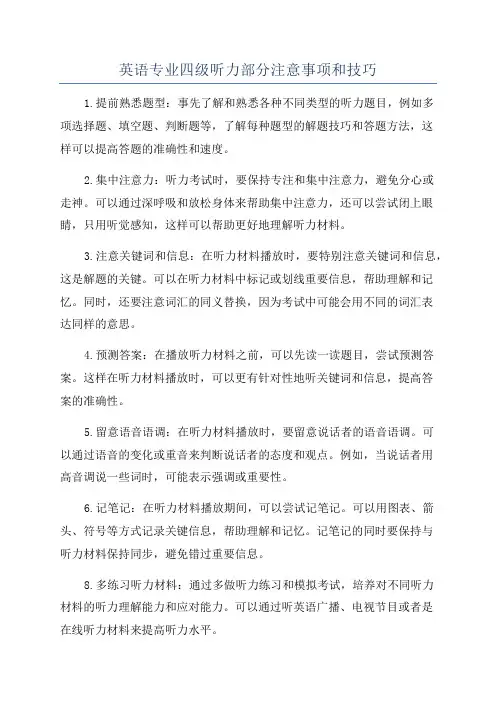
英语专业四级听力部分注意事项和技巧1.提前熟悉题型:事先了解和熟悉各种不同类型的听力题目,例如多项选择题、填空题、判断题等,了解每种题型的解题技巧和答题方法,这样可以提高答题的准确性和速度。
2.集中注意力:听力考试时,要保持专注和集中注意力,避免分心或走神。
可以通过深呼吸和放松身体来帮助集中注意力,还可以尝试闭上眼睛,只用听觉感知,这样可以帮助更好地理解听力材料。
3.注意关键词和信息:在听力材料播放时,要特别注意关键词和信息,这是解题的关键。
可以在听力材料中标记或划线重要信息,帮助理解和记忆。
同时,还要注意词汇的同义替换,因为考试中可能会用不同的词汇表达同样的意思。
4.预测答案:在播放听力材料之前,可以先读一读题目,尝试预测答案。
这样在听力材料播放时,可以更有针对性地听关键词和信息,提高答案的准确性。
5.留意语音语调:在听力材料播放时,要留意说话者的语音语调。
可以通过语音的变化或重音来判断说话者的态度和观点。
例如,当说话者用高音调说一些词时,可能表示强调或重要性。
6.记笔记:在听力材料播放期间,可以尝试记笔记。
可以用图表、箭头、符号等方式记录关键信息,帮助理解和记忆。
记笔记的同时要保持与听力材料保持同步,避免错过重要信息。
8.多练习听力材料:通过多做听力练习和模拟考试,培养对不同听力材料的听力理解能力和应对能力。
可以通过听英语广播、电视节目或者是在线听力材料来提高听力水平。
综上所述,英语专业四级听力部分需要考生们在有限时间内准确理解和把握听力材料的关键信息。
通过提前熟悉题型、集中注意力、注意关键词和信息、预测答案、留意语音语调、记笔记、不纠结细节和多做练习等方法,可以帮助考生取得更好的听力成绩。
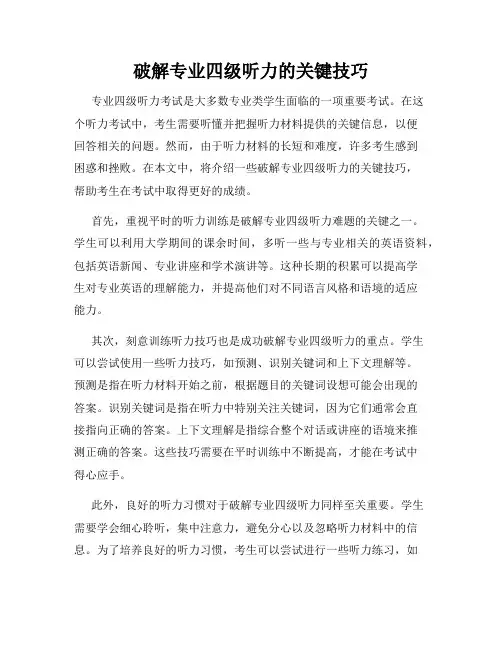
破解专业四级听力的关键技巧专业四级听力考试是大多数专业类学生面临的一项重要考试。
在这个听力考试中,考生需要听懂并把握听力材料提供的关键信息,以便回答相关的问题。
然而,由于听力材料的长短和难度,许多考生感到困惑和挫败。
在本文中,将介绍一些破解专业四级听力的关键技巧,帮助考生在考试中取得更好的成绩。
首先,重视平时的听力训练是破解专业四级听力难题的关键之一。
学生可以利用大学期间的课余时间,多听一些与专业相关的英语资料,包括英语新闻、专业讲座和学术演讲等。
这种长期的积累可以提高学生对专业英语的理解能力,并提高他们对不同语言风格和语境的适应能力。
其次,刻意训练听力技巧也是成功破解专业四级听力的重点。
学生可以尝试使用一些听力技巧,如预测、识别关键词和上下文理解等。
预测是指在听力材料开始之前,根据题目的关键词设想可能会出现的答案。
识别关键词是指在听力中特别关注关键词,因为它们通常会直接指向正确的答案。
上下文理解是指综合整个对话或讲座的语境来推测正确的答案。
这些技巧需要在平时训练中不断提高,才能在考试中得心应手。
此外,良好的听力习惯对于破解专业四级听力同样至关重要。
学生需要学会细心聆听,集中注意力,避免分心以及忽略听力材料中的信息。
为了培养良好的听力习惯,考生可以尝试进行一些听力练习,如听写和听后复述等。
这些练习不仅可以提高对听力材料的理解和记忆力,还可以帮助培养耐心和集中注意力的能力。
另外,积极参与互动也是破解专业四级听力的关键技巧之一。
在听力考试中,考生有时需要根据听到的信息回答问题或进行相关的讨论。
在平时的学习生活中,学生可以尝试与同学进行合作讨论、参加小组活动以及积极参与听力实践,以提高自己在听力交流方面的技巧和信心。
最后,保持积极的心态也是破解专业四级听力难题的重要因素。
听力考试可能会遇到一些难以理解的词汇和句子结构,但要相信自己的能力,努力理解并寻找答案。
保持积极的心态有助于缓解紧张情绪,并提高在考试过程中的表现。
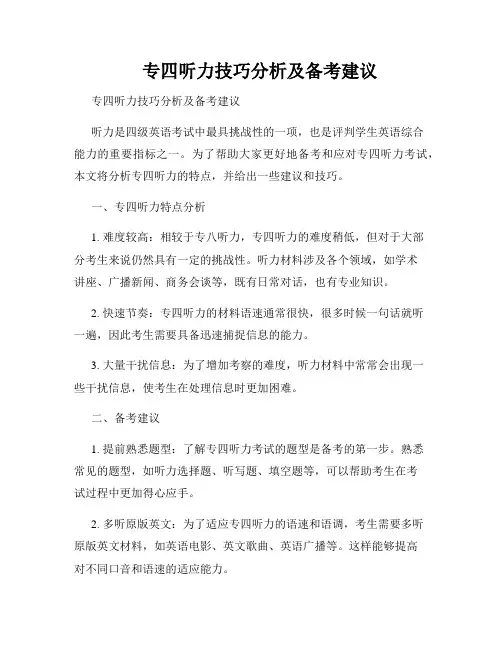
专四听力技巧分析及备考建议专四听力技巧分析及备考建议听力是四级英语考试中最具挑战性的一项,也是评判学生英语综合能力的重要指标之一。
为了帮助大家更好地备考和应对专四听力考试,本文将分析专四听力的特点,并给出一些建议和技巧。
一、专四听力特点分析1. 难度较高:相较于专八听力,专四听力的难度稍低,但对于大部分考生来说仍然具有一定的挑战性。
听力材料涉及各个领域,如学术讲座、广播新闻、商务会谈等,既有日常对话,也有专业知识。
2. 快速节奏:专四听力的材料语速通常很快,很多时候一句话就听一遍,因此考生需要具备迅速捕捉信息的能力。
3. 大量干扰信息:为了增加考察的难度,听力材料中常常会出现一些干扰信息,使考生在处理信息时更加困难。
二、备考建议1. 提前熟悉题型:了解专四听力考试的题型是备考的第一步。
熟悉常见的题型,如听力选择题、听写题、填空题等,可以帮助考生在考试过程中更加得心应手。
2. 多听原版英文:为了适应专四听力的语速和语调,考生需要多听原版英文材料,如英语电影、英文歌曲、英语广播等。
这样能够提高对不同口音和语速的适应能力。
3. 增强语法和词汇水平:听力考试中,对语法和词汇的理解十分关键。
考生可以通过阅读英语文章、背诵单词等方式来提高语法和词汇水平,从而更好地理解听力材料。
4. 划分关键信息:考生在听材料时要学会辨别关键信息,将其划分出来,以便在答题时更加准确。
可以通过一些符号、缩写或者标记的方式来帮助记录和划分。
5. 预测选项:在听力选择题中,考生可以提前阅读选项,并根据选项的特点和听力材料中的关键信息进行比较。
这样可以减少答题的时间和错误率。
6. 多做模拟题:模拟题是考生备考的必备工具。
通过做模拟题,考生可以熟悉考试的时间限制和题型要求,提高答题的速度和准确性。
三、听力技巧1. 预测内容:在材料播放前,可以通过题目和选项来预测即将听到的内容,这样可以帮助考生更快地捕捉关键信息。
2. 注意同义替换:材料中的关键信息有可能会以不同的形式出现,考生需要注意同义替换,并在听到相关信息时将其关联起来。
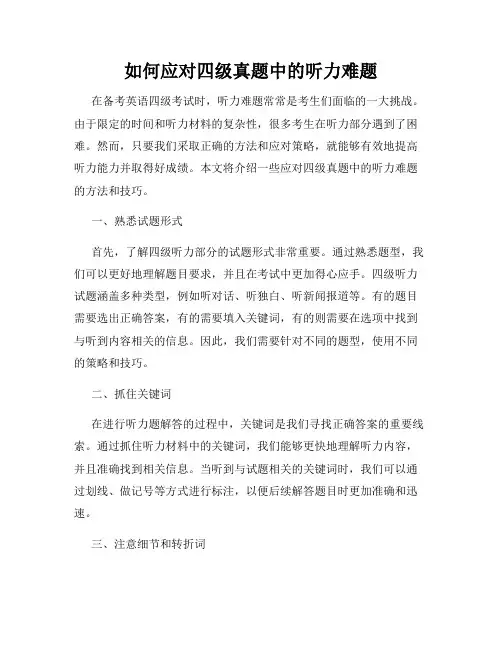
如何应对四级真题中的听力难题在备考英语四级考试时,听力难题常常是考生们面临的一大挑战。
由于限定的时间和听力材料的复杂性,很多考生在听力部分遇到了困难。
然而,只要我们采取正确的方法和应对策略,就能够有效地提高听力能力并取得好成绩。
本文将介绍一些应对四级真题中的听力难题的方法和技巧。
一、熟悉试题形式首先,了解四级听力部分的试题形式非常重要。
通过熟悉题型,我们可以更好地理解题目要求,并且在考试中更加得心应手。
四级听力试题涵盖多种类型,例如听对话、听独白、听新闻报道等。
有的题目需要选出正确答案,有的需要填入关键词,有的则需要在选项中找到与听到内容相关的信息。
因此,我们需要针对不同的题型,使用不同的策略和技巧。
二、抓住关键词在进行听力题解答的过程中,关键词是我们寻找正确答案的重要线索。
通过抓住听力材料中的关键词,我们能够更快地理解听力内容,并且准确找到相关信息。
当听到与试题相关的关键词时,我们可以通过划线、做记号等方式进行标注,以便后续解答题目时更加准确和迅速。
三、注意细节和转折词在听力材料中,细节和转折词往往提供了理解和解答问题所需的重要线索。
细节包括数字、日期、地点、人名等具体的信息,而转折词则可以帮助我们理解对话或者篇章中的逻辑关系和变化。
因此,在听力过程中,我们应该特别注意这些细节和转折词,并将其与试题进行对应,从而更好地解决听力难题。
四、提高听力技巧除了应对策略,进一步提高听力技巧也是应对听力难题的关键。
首先,我们可以通过多听多练来增加听力素材的积累,提升听力水平。
可以选择收听英语广播、观看英语电影和纪录片,以增强对不同语速、口音和语调的听力理解能力。
其次,我们可以在日常生活中尝试用英语进行交流和讨论,提高听懂和回应他人的能力。
此外,利用各种听力训练资源,如真题、模拟试卷等,进行有针对性的练习和训练也是非常有效的方法。
总之,在应对四级真题中的听力难题时,我们可以通过熟悉试题形式、抓住关键词、注意细节和转折词,以及提高听力技巧等方法来提高自己的听力能力。
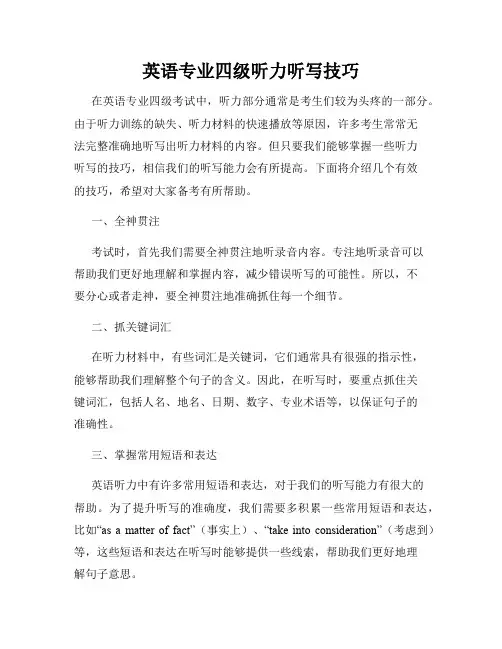
英语专业四级听力听写技巧在英语专业四级考试中,听力部分通常是考生们较为头疼的一部分。
由于听力训练的缺失、听力材料的快速播放等原因,许多考生常常无法完整准确地听写出听力材料的内容。
但只要我们能够掌握一些听力听写的技巧,相信我们的听写能力会有所提高。
下面将介绍几个有效的技巧,希望对大家备考有所帮助。
一、全神贯注考试时,首先我们需要全神贯注地听录音内容。
专注地听录音可以帮助我们更好地理解和掌握内容,减少错误听写的可能性。
所以,不要分心或者走神,要全神贯注地准确抓住每一个细节。
二、抓关键词汇在听力材料中,有些词汇是关键词,它们通常具有很强的指示性,能够帮助我们理解整个句子的含义。
因此,在听写时,要重点抓住关键词汇,包括人名、地名、日期、数字、专业术语等,以保证句子的准确性。
三、掌握常用短语和表达英语听力中有许多常用短语和表达,对于我们的听写能力有很大的帮助。
为了提升听写的准确度,我们需要多积累一些常用短语和表达,比如“as a matter of fact”(事实上)、“take into consideration”(考虑到)等,这些短语和表达在听写时能够提供一些线索,帮助我们更好地理解句子意思。
四、注意连读和弱读英语中的连读和弱读是一个很重要的语音现象,也经常出现在听力材料中。
连读是指在两个单词之间发生连读的现象,而弱读是指在句子中某些词汇发音不够明显的现象。
理解和掌握连读和弱读现象能够帮助我们更加准确地听写出句子的内容。
五、练习速记技巧速记技巧对于听写能力的提升也是非常重要的。
在考试时,时间是非常紧张的,因此我们需要善于使用速记技巧快速记录内容。
比如,可以采用简化的图标或符号代替某个单词,或者使用首字母缩写等。
这些技巧能够帮助我们在有限时间内把所听到的内容快速准确地记录下来。
六、反复练习提高听力听写技巧最有效的方法就是不断地反复练习。
在备考过程中,我们可以找一些相关的听力材料进行听写,不仅可以加深对听力材料的理解,还能够提升自己的听写能力。
专四专八听力技巧
专四专八听力技巧如下:
1. 加强储存记忆:按意群捕捉讲述内容,不要一字一字地听,而要抓住关键词或句。
听完一段不可能一字一句地回忆,而要建立整体概念。
2. 加强及时反映:只有当你建立了整体概念,才能达到立即回忆。
3. 做简短笔记:在听较长材料时,用缩写或自己能看懂的点、线或其它标记做些快速记录,如:数字、地点、人名或其它关键词语等。
4. 多做听写和记笔记训练:这种练习有助于储存记忆,训练抓住关键词或句,以及中心思想。
5. 精听与泛听:同一段内容反复听若干次,这样有助于增加记忆的持续时间;听不同内容的材料,有助于增加听各种不同声音,口音及语速的经验。
6. 听力素材的选择:听力训练的最好素材是历年的听力考题。
建议精听、反复听,直到听懂为止。
如果真题已经练得很熟了,也可以做一些听力模拟题。
7. 作答时间的控制:考生平时训练一定要按考试规定的时间和听音次数来作答。
如果一开始做不到这样,也可以先一句一句反复精听,训练到一定的程度后,再逐步增加一次听的句子数量,直到按考试要求来作答。
8. 错题原因的分析:考生要对自己做错了的题目进行分析,了解出错的原因是什么,是听音时漏听了关键处,还是词汇不过关,或是跟不上录音的语速,或其他原因。
以后要争取避免因同样的原因而答错丢分。
9. 放音形式的一致:考生要了解清楚自己学校在专四专八考试时是公放录音还是要求考生戴耳机听录音。
平时训练时尽量与考试放录音的方式一致,以免考试的时候因不适应而发慌,甚至漏听很多内容,严重影响到听力题的得分。
希望以上信息对您有帮助!。
英语专业四级听力技巧听写Dictation1、认真听清第一遍,了解文章主旨大意。
2、充分利用上下文,获取最大量的信息。
在听写测试中,上下文对考生理解听力内容有着非常重要的作用。
在听写时,考生由于紧张等因素对个别单词反应不过来,或者难以确定所听到的词的具体形式,如名词的单复数、动词的时态和语态等,这时就必须通过上下文来确定。
如英语中bare和bear两个单词的读音相同,原文中究竟是哪个词,必须通过上下文才能确定。
3、快速记下所听到的单词或词组,学会边听边记。
4、认真听清第四遍,即时补充与检查。
听写评分标准:1. 听写共分15小节,每节1分,扣分一律写在试卷右边的空白处。
大错误下面画线。
小错误用圆圈表示,重复错误用三角记号表示。
2. 每节最多扣1分。
3. 重复错误,仅扣一次分。
4. 错误共分两类:小错误(minor mistakes)和大错误(major mistakes),分别扣0.25分和0.5分。
A. 小错误:1)单词拼写错一到两个字母。
例:steadily → staedily;harbor → habor两个字母以下的词、次序颠倒算小错。
2)标点符号错误(含大小写)。
例:World War I → world war one, and then adopted → . And then adopeted3) 冠词、单复数错误。
例:until the beginning → until beginning; parent → parents4)小错误扣分标准:小错误在一节中出现一次,留作总计;出现两次:扣0.5分;出现三次:扣0.5分后留作总计;出现四次:扣1分。
5)未扣分小错误的扣分标准:累计2 ~ 4 个:扣0.5分累计5 ~ 8 个:扣1分B. 大错误:漏写、加词、造词、换词(冠词作小错计)、大移位、时态错误,每个错误扣0.5分。
例:loved → love;task — test;trip — trap;flee — flea;have finished — finsh(ed)5. 一些特例的扣分标准:下列情况不扣分:World War I → World War Onera ce c ar → racecarwell-balanced → well balanced90 percent → 90%6. 总分只有0.5分时,以1分计算;其余总分中如含小数点的,小数舍去,保留整数,如12.5 → 12;7.5 → 77. 空白卷一律打0分。
英语专四听力提高十大练习技巧第一、自身准确的发音。
自身准确地道的发音不能让你在听力上面无往不利,但是不准确不地道的发音绝对不能有效的解决听力问题。
而准确地道的发音往往又得之于在听力中纠正自己的发音。
两者是互相进展的。
第二、阅读应与听力练习同时,同比重的进展。
很多人为提高听力把所有时间都集中在听力材料的练习上。
我肯定的说,这是个错误。
我们不是在国外,你无论营造,都不能有一个真正的外国的文化气氛在你身边,这一个已经可以说明只注重单一的听力练习是错误的。
其次,听力练习中,你接触到多少信息呢?这个信息包括词汇、语法、习惯用法、文化等等在接触材料时能够遇到的所有东西。
我敢说你听十盒磁带不及我读一本原著的信息量。
如果别人的说话内容超出了你那听得滚瓜烂熟的磁带内容,你是否有信心听懂?这可是十分自然的事情,你自己日常的说话内容,是否可以用十盒磁带来装得下来。
只要你发音正确,你在阅读时接触到的词,如果让你在听的时候遇到,很多都有可能听懂。
倘假设你的听力目标是想听就能听懂什么的话,阅读起到的作用更是举足轻重。
同时,如果你连在阅读中都无法读懂的句子,你在听力中能够听懂吗?我想来个总结:词汇量和语法是阅读的关键,阅读量的多少以及阅读能力的好坏决定听说能力的上下,而我们语言,又必须从听说开始。
第三、 VOA Special English是很好的听力材料,但是你已经听够了,给点信心自己,听一些外国人正常语速的东西。
你不可能要求外国人用Special English的语速说话给你听。
事实上Special English和正常的说话之间的差异并不是大家想的那么小,而语速对听力的影响更不是中那么微弱,往往是起了决定性的影响的。
因为正常语速跟慢速之间不同的地方实在太多,譬如连读、省略、轻读、模糊等等,这些都是影响听懂与否的关键要素。
Special English里全是完整的句子,可是实际上正常的说话表达才不需要那么正儿八经呢?你是否有信心听懂?况且Special English里更遇不到丰富的词汇,复杂的构造。
英语专业四级听力难题策略随着英语的全球化应用和广泛普及,英语专业成为了许多学生的首选专业之一。
然而,对于很多学生来说,英语听力一直是一个艰难的挑战。
本文将探讨一些策略,帮助英语专业四级考试中的学生克服听力难题。
一、提前准备(Preparation)成功的任何考试都需要提前准备,英语专业四级听力考试也不例外。
以下是一些建议以帮助你做好提前准备:1. 背景知识(Background Knowledge):在考前,花一些时间了解听力考试中可能出现的常见主题和背景知识。
这将帮助你更好地理解听力材料,更容易回答问题。
2. 听力材料(Listening Materials):寻找与四级听力考试类似的听力材料,并多加练习。
这可以帮助你熟悉听力考试的格式和题型,并提高你的技能。
3. 学习策略(Learning Strategies):了解一些有效的学习策略,如主动听力、笔记记法等,这些策略可以帮助你更好地理解听力内容,并提高听力技能。
二、听力技巧(Listening Skills)除了提前准备,掌握一些听力技巧也是克服英语专业四级听力难题的关键。
以下是一些听力技巧:1. 预测(Prediction):在听力开始前,快速浏览问题,并尝试预测可能的答案。
这样可以帮助你更有针对性地关注听力内容,并提高你的听力效率。
2. 注意关键词(Key Words):在听力过程中,注意关键词是非常重要的。
关键词通常是与问题相关的信息,掌握这些关键词可以帮助你更快地找到正确答案。
3. 笔记(Note-taking):适当地使用笔记是提高听力能力的有效方法。
在听力过程中,尽量做简洁的记录,包括关键词、数字和主要观点。
这样可以帮助你更好地理解听力内容,并在回答问题时提供支持。
4. 听力材料的整体理解(Overall Understanding):除了关注细节,还要注意听力材料的整体理解。
这意味着要抓住主要观点、目的和态度等方面。
理解整体内容有助于回答综合性问题和推理题。
专四英语听力方法必看1.培养听力习惯首先,要养成听英语的习惯。
每天用一定的时间来听英语磁带、英语新闻、英语歌曲、英语电影等,提高自己对英语的听力感觉。
你可以选择感兴趣的话题或内容,这样能更好地保持注意力。
2.多样化听力材料不同类型的听力材料对言语速度、语言风格、词汇难度等都有不同的要求,因此要多种多样地听不同类型的材料。
可以通过听新闻、学术演讲、故事等来扩展自己的听力技能。
3.创造英语环境4.注意听力技巧在听力考试中,重要的不仅是对英语的词汇和语法的掌握,还需要一些技巧来更好地应对听力题目。
例如,注意关键词,根据上下文猜测意思,快速笔记等。
掌握这些技巧可以帮助你更好地应对听力考试。
5.在线听力资源互联网上有很多免费的英语听力资源,例如BBC Learning English、VOA Learning English等。
这些网站提供了丰富的英语听力材料,包括新闻、故事、访谈等等。
你可以利用这些资源来加强自己的听力能力。
6.多做模拟题在备考阶段,多做一些专四听力模拟题可以帮助你熟悉考试题型,掌握答题技巧。
同时,模拟题中的听力材料也可以是你的练习素材,提高对不同语速和口音的理解。
7.词汇和语法知识除了听力技巧,理解和把握听力材料的词汇和语法知识也是非常重要的。
这样可以更准确地理解口音、语言风格和句子结构。
建议你在备考期间复习相关的词汇和语法知识。
总之,专四英语听力考试需要建立良好的听力习惯、扩充听力素材、掌握听力技巧以及充分准备词汇和语法知识。
希望以上建议可以帮助你更好地备考和应对专四英语听力考试。
祝你顺利通过考试!。
如何决战专业英语四级听力全国高等学校英语专业四级考试听力部分的测试题型分为两个主要部分:Dictati on和Listening Comprehension。
第一部分Dictation为1篇约150个词的短文,全篇文章共念4遍。
第一遍用正常速度,每分钟120个词,让学生听懂短文的大意。
第二、三遍则用较慢的语速朗读。
句子或分句间留有1 0~15秒左右的间隙,特别长的句子有意群停顿,让学生书写。
第四遍再用正常速度朗读,在这期间,考生对自己所记录的内容根据录音核实、检查。
这一部分的时间是15分钟。
第二部分是Listening Comprehension。
它由三个部分组成,即Section A、S ection B以及Section C,共有25道选择题。
各部分的题型分别为:Section A: Statement,共8题;Section B:Conversation,共9题;Section C:News Broadcas t,在4篇左右的VOA或BBC听力材料之后,考生需就每篇材料分别完成1~3道书面选择题,共8题。
每一道选择题后留给考生10秒的间隙,考生必须利用这一间隙选出答案,录音的语速为每分钟120~150个词,只读1遍。
整个听力理解部分的测试时间为20分钟。
二、专业四级听力测试要点及基本应试对策(一)听写1.听写的测试要点听写所涉及的知识大致可分为语言因素和非语言因素两大类。
语言因素主要指语言知识,即语言基本功中包括诸如语言知识、词汇知识、句法知识和语用知识等。
现分述如下:1)语言知识。
包括对英语每一个音的发音部位和发音方法,对元音和辅音的语音特征及区别,对音节结构和同化的规则,对省音和加音的现象,以及对语调和重音规则等知识的了解和掌握。
2)词汇知识。
包括对英语词汇的分类、构词规则,以及习语、短语的了解和掌握。
3)句法与语义知识。
包括对句子结构,句型转换规则,语义特征如歧义、反义等知识的了解和掌握。
4)语用知识。
包括对语言行为的预设、指示以及语言环境等相关知识的了解和掌握。
2.听写的基本应试对策1)注意语音问题。
误听是听写中常出现的错误。
很多考生有这样的体会:有些单词写出来认识,但在录音中却听不出来或听错。
这种情况经常发生。
因为在英语里,同一个字母就有多种不同的读音,例如:bag, what, class, alike等词中的字母“a”的读音就各不相同。
而同一个读音可以用几个不同的字母来表示,例如:[i]的读音,在busy, private, homeless, women, la dies, hymn, give, Sunday等词中的拼写形式又不相同。
所以考生一定要弄懂某一字母在具体单词中的正确发音,以及某一单词中每个字母的正确发音,以免在听力上产生错觉。
2)处理好听与写的关系。
听与写是一对矛盾。
由于时间限制,有些考生可能出现顾了听而来不及写或顾了写而影响听的现象。
因此,在听写中必须正确处理好两者的关系。
在听写中,写应依据以下三个步骤:①听;②边听边写;③边听边检查。
有的考生在听第一遍录音时就动笔写,这是不正确的。
这样做看起来好像抓住了一些内容,但容易分散精力,影响对全文内容的理解,造成因小失大的结果。
因此,在听第一遍录音时应着重了解全文大意,必要时可记下几个关键词语。
在放第二、三遍录音时,考生可利用句间停顿和长句中的意群停顿记录所听内容,此时应做到听写兼顾,边听边写,准确地写下每一个单词。
如果出现一些长句子,为了不影响记录后面的内容,可以先记下该句的词首、词尾及一两个关键词,等到听第三遍时补充完整。
如若碰到生词或没有把握的词,可以根据其发音先拼写一个词,然后利用其他时间去思考。
在放第四遍录音时,考生应在听音的同时检查所记内容是否与原文完全一致,单词拼写是否正确(包括标点符号、大小写、人称、同音异义及时态等)。
另外,考生在做这一部分题目时,注意力应高度集中,保持头脑清醒,不能分散精力。
同时,考生还有必要提高自己的书写速度。
听写中的停顿毕竟有限,书写速度如果太慢,前一句尚未写完而后句的录音已开始播放,这时考生有可能因心理紧张而乱了方寸,造成断词、断句的后果,从而影响听写质量。
(二)听力理解1.听力理解的测试要点听力理解是一种接受性技能,也是一个复杂、积极、多层次的思维过程。
它是诸多语言技能的综合运用,涉及到语音、语调、词汇、句型、句法、语言和非语言等诸多方面的知识。
现归纳如下:1)语音语调。
英语专业的学生经过两年的学习,已有相当的英语语言知识,已在语音、语速、语流等方面接受过训练,了解了重读、弱读、连读、省音、不完全爆破、同化等知识。
但在口语中,对语调意义可超出语音和词汇意义认识不足。
语调可用来表示谈话者对事件的态度、感情、口吻和意图。
学生要培养从所听到的片言只语中,抓住说话者的态度。
例如:同一个单词well,使用不同的语调,可以表示不同的感情。
A.Well, and what are you going to do about it? 表示“质疑”(Challenge);B. Well, I am surprised to see you! 表示惊奇“(Surprise);C. Well, let me think. Yes, I remember. His name was Peter.表示”犹豫“(Hesitation);D. Well, well, look who's come to help-now it's all finished!表示”讽刺“(Sarcasm);E.Well, I'm glad that's over.表示”安慰“(Relief);F. Well, I know what I'll do. I'll ask Jim to give me a lift.表示”决心“(Decision);G. Well, I suppose there's nothing we can do about it.表示”无可奈何“(Resignation);H. Well, in some ways we enjo yed it.表示”持保留态度“(Qualified approval)2)句型句法。
熟悉英语口语基本句型结构可对所听到的内容情景做出快速反应。
例如下列句型都可用来提出建议和意见。
A. It might be a good idea to wait and see what the weather is like.B. What do you think of seeing the film tomorrow?C. Wouldn't it be a good (better) idea to buy tickets in advance? D. Would you like to go on a river-trip up the Thames?; E. Shall we have lunch at the “Good Lion”restaurant?; F. How about having some wine with our supper?; G. Let's have a dinner party.;H. Why not throw all these old newspapers away?; I. We'd better let our frie nds know we're coming.; J. We might as well sit down while we're waiting.;而下列句型通常用来表示请求:A. Would you show me those photographs, ple ase?;B. Would you mind telling me how to use the dictionary?;C. May I have my key, please?;D. Won't you have another cup of coffee?;E. Would you like to have more chicken?;F. Why don't you come earlier?;G. Could you tell me the time, please?;句法的知识可帮助提高捕捉信号词的能力,可以预测可能听到的语言信息,掌握语段内在关系,便于理解记忆。
例如:A.表示比较(Comparison)likewise, similarly, in comparison; B.表示对比关系(Contrast)however, unlike, whereas, on the other hand; C.表示因果关系(Cause and effect)therefore, thus, accordingly, then; D.表示举例(Example)for ex ample, namely, for instance; E.表示总结(Summary)in short, on the whole, to s um up;3)词汇。
听熟基本句型结构,有丰富的英语语言知识——时态、语态、单复数等语法知识,如有大量词汇和词组,耳听会意就会迎刃而解。
(1)了解某些常用单词在口语中的不同意思。
- Would you mind waiting a few minutes?你等几分钟可以吗?No, I don't mind in the least.当然可以。
- Mind how you go.(道别时说)您慢走。
- Mind your footing!小心,站稳了! - Susan minds the children while I'm at work.我工作时,苏珊照料孩子们。
- Mind your own business.别管闲事。
- Mind you go.你一定得去。
(2)善于抓住关键词。
英语单词分为实词和虚词。
实词指的是动词、名词、形容词、副词和数词。
实词一般是强调词,语流较强,语速较慢,较容易听清。
抓住这些关键词,对听懂语段是至关重要的。
(3)养成听VOA、BBC广播和阅读China Daily的习惯,从而获得有关词汇。
例如:①机构名称:UNESCO (United Nations Educational Scientific and Cultural Organization)联合国教科文组织; P .L.O. (Palestine Liberation Organiza tion)巴勒斯坦解放组织; UNICEF (United Nations International children’s emerg ency fund)联合国儿童基金会。